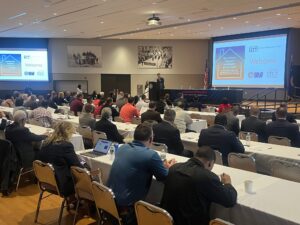News
Massachusetts’ Leaders and Experts Focus on Affordable Housing Solutions and Construction Careers at Economically Targeted Investments Summit
Governor Maura Healey, Treasurer Deborah Goldberg, new Boston Housing Authority Administrator Kenzie Bok, and North America’s Building Trades Unions President Sean McGarvey uplifted economically targeted investments as solution to the crisis

BOSTON – With people throughout the state increasingly unable to afford housing, the AFL-CIO Housing Investment Trust (HIT) hosted pension investment professionals, elected officials, labor, and affordable housing experts to discuss how union pension funds and public investments are catalysts for equitable development and workforce growth.
They were joined by Governor Maura Healey who emphasized the need to unlock development partnership opportunities and work with cities, towns, and developers to build more housing as quickly as possible and for those who need it most. There are clear examples of how pension funds can meet fiduciary responsibilities while investing in affording housing in local communities. “Housing is one of the greatest challenges that we face as a state. We’ve got to relieve pressures so that people can afford to live and work here, said Massachusetts Governor Maura Healey. “ I appreciate all the work being done by powerful worker-led organizations to expand access to careers in the trades because they create the economic opportunities for both mobility and transformation in this state.”
Chang Suh, CEO of HIT, taking stock of the moment, highlighted the importance of pension and public investments in creating new neighborhoods of affordable and workforce housing. “Our investments have already created thousands of homes and construction jobs, while generating competitive returns, and we are committed to doing even more to create affordable housing and provide career pathways for the people of the Commonwealth,” said Chang Suh, Chief Executive Officer & Chief Investment Officer, AFL-CIO Housing Investment Trust (HIT).
The summit tackled the most pressing housing and job creation challenges facing Boston and the Commonwealth, including rising rents, shortage of affordable and workforce housing units, and creating union construction career pathways for Massachusetts residents.
In her opening remarks, Massachusetts Treasurer Deborah B. Goldberg emphasized the need for bold action to address the affordable housing crisis. “Encouraging and focusing on the developmen t of affordable housing and facilitating employment for union members in the construction trades and related industries is critically important for our state and economy,” said Goldberg, chair of MassPRIM, which is an investor in the HIT. “The AFL-CIO Housing Investment Trust is an example of the kind of work that can be done when we work together.”
t of affordable housing and facilitating employment for union members in the construction trades and related industries is critically important for our state and economy,” said Goldberg, chair of MassPRIM, which is an investor in the HIT. “The AFL-CIO Housing Investment Trust is an example of the kind of work that can be done when we work together.”
Massachusetts needs 108,000 units of affordable housing just to meet housing demand. As some developers enter a holding pattern in this uncertain economy, pension funds’ investments in vehicles such as the HIT can play a critical role in long-term planning to meet this demand.
Kenzie Bok, incoming Administrator of the Boston Housing Authority, shared the challenges the city of Boston faces around affordable housing and its intersection with the city’s climate goals. “The Green New Deal is a huge piece of the puzzle for affordable and healthy housing. There are no small solutions to big problems. The very existence of the Housing Investment Trust is a stake in the ground for addressing these issues at once in concert together,” said Kenzie Bok, Incoming Administrator, Boston Housing Authority. “This partnership between organized labor, investment capital, and public housing represents the essential foundation for a better Boston, where all people can thrive.”
The summit featured three panels that delved into various aspects of the crisis: the need to create construction career opportunities, that pay well enough to afford housing; the shortfall in public funding to support building workforce and affordable housing; and how pension funds can responsibly invest to address these issues. With the median rent for a one-bedroom apartment sitting at $2,583 per month and the average home price exceeding $550,000, the middle class in Massachusetts is facing significant challenges. The rising cost of housing is driving out working families who contribute to building and maintaining thriving communities, such as those who teach our children and care for our seniors, as well as the construction workers required to build the housing the state needs.
The HIT hosted the summit, with support from various organizations, including Local 103 IBEW and NECA Greater Boston. The HIT has invested $931.5 million towards $2.4 billion of total development in Massachusetts, creating 6,425 units of rental housing built with 100% union labor. The summit’s discussions will undoubtedly pave the way for new policies, initiatives, and collaborations that will help make housing more affordable and create new job opportunities for people in the construction industry.
For example, via its investment in the HIT, Local 103 IBEW has helped to create not only thousands of affordable housing units but also generated $1.9 billion in total wages and benefits for working families, including new career opportunities in union construction for Boston residents. “We must commit to making Boston stronger by investing in solutions that provide high-quality, affordable housing solutions that work for our communities – and that create a virtuous cycle of good union jobs”, said Lou Antonellis, Business Manager of IBEW 103. “Workers of IBEW are proud to be one of HIT’s biggest investors because we show up, not just by investing in affordable housing projects but also by building them.”
About the HIT: The HIT is a fixed-income, investment-grade mutual fund with $6.3 billion in net assets. For nearly 40 years, the HIT has been a leader in putting union and public pension capital to work to produce competitive returns and achieve mission-related collateral objectives. Investors should consider HIT’s investment objectives, risks, and expenses carefully before investing. Investors may view the HIT’s current prospectus, which contains more complete information, on its website at www.aflcio-hit.com and may obtain a copy from the HIT by calling the Marketing and Investor Relations Department collect at 202-331-8055. Investors should read the current prospectus carefully before investing. Job and economic impact figures are estimates calculated using IMPLAN, an input-output model, based on HIT and HIT Subsidiary Building America CDE, Inc. project data. The data is current as of March 31, 2023. Economic impact data is in 2022 dollars and all other figures are nominal.
Contact: Dianne Ambrose, 202-467-2569, dambrose@aflcio-hit.com
1227 25th Street, NW
Suite 500
Washington, DC 20037
Phone: 202-331-8055
1227 25th Street, NW
Suite 500
Washington, DC 20037
Phone: 202-331-8055